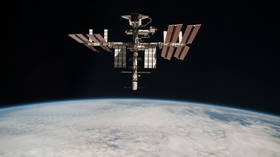China complains about near-misses with SpaceX satellites
Beijing says that Elon Musk’s Starlink satellites passed dangerously close to its manned space missions, endangering the lives of its astronauts
The Chinese government has filed a complaint with the UN Office for Outer Space Affairs, claiming that its space station had to take evasive action to dodge starlink satellites on two occasions this year.
The complaint, lodged with the UN earlier this month, alleges that a Starlink satellite in April dropped from its regular orbit of 555 kilometers above the earth to 382 kilometers (237 miles) – close to the China Space Station’s (CSS) orbit of around 390 kilometers (242 miles). This change in orbit made a collision possible, and Beijing said that the crew of the CSS were forced to “conduct an evasive manoeuvre” to avoid this possibility.
The second incident took place in October. Once again, the Chinese crew of the CSS took action to avoid a Starlink satellite, which the report claimed was “continuously manoeuvring,” following an “unknown” strategy.
The satellites, the Chinese delegation wrote, “could constitute a danger to the life or health of astronauts.”
SpaceX already has agreements with NASA to launch its satellites into orbit five kilometers (three miles) away from the US space agency’s craft or the International Space Station (ISS), which circles the earth roughly 20 kilometers (12.4 miles) above the CSS. SpaceX also claims that its satellites are equipped with autonomous collision avoidance technology, and insists that other spacecraft don’t need to take evasive maneuvers to dodge them.
While the ISS hasn’t been forced to avoid Starlink satellites before, it did have to avoid space debris on numerous occasions. Earlier this month, the ISS adjusted its orbit to avoid the remains of an American Pegasus rocket. The wreckage of a SpaceX Falcon rocket passed in close proximity to the ISS a week earlier, and the international station has also had to dodge Chinese rocket debris before.
SpaceX has thus far put more than 1,700 Starlink satellites into orbit, and the company plans on launching more than 40,000 in total, in a bid to provide satellite internet access to the entire world. However, scientists have raised concerns that such a high number of satellites will add significantly to an already cluttered orbital environment, and astronomers have complained that the satellites will impede their view of the night sky.
You can share this story on social media:








Comments are closed.